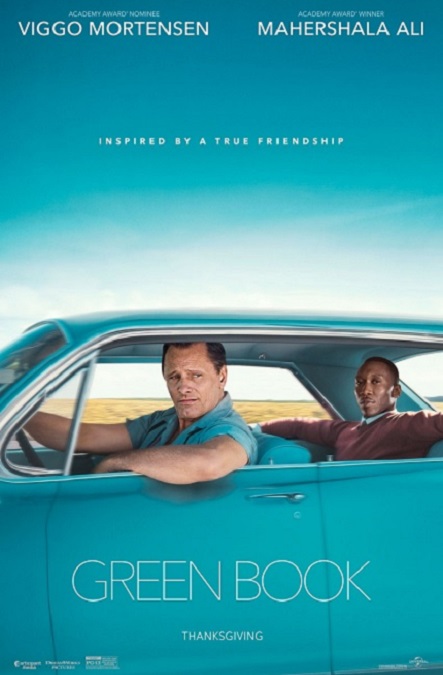



Green Book – 2018
This was a pretty good movie, but like many critics, I am divided on how good I think it was. On the one hand, it was a wonderful and pleasant story about a brilliant and educated black pianist who hires an uneducated and crass white guy to be his driver in the deep south for a concert tour. It dealt with the touchy issue of racism in a respectful and positive way. But on the other hand, it seemed to be another version of the 1989 Best Picture winner, Driving Miss Daisy. Though the plots are clearly different, there are a lot of undeniable similarities, and because of them, the film had a certain amount of predictability.
It is important to understand that the movie is based on a true story, and my research didn’t turn up any serious historical inaccuracies. The script was written by three men, Brian Hayes Currie, Peter Farrelly, and the son of the main character, Nick Vallelonga. That being said, the main supporting character was that of the famous musician, Don Shirley, who died in 2013. Apparently the Shirley family was not consulted concerning the concert pianist until after development, and they feel that the movie misrepresented him and his relationship with his family.
Interesting note: When Mahershala Ali, the actor playing Don Shirley, heard that the Shirley family was displeased with the film portrayal, he was quoted as saying, “I did the best I could with the material I had” and that he was not aware that there were “close relatives with whom I could have consulted to add some nuance to the character.”
Another interesting note: Per Wikipedia, “Nick Vallelonga acknowledged that members of the Shirley family were hurt that he did not speak to them, and that he was sorry that they were offended. He told Variety that ‘Don Shirley himself told me not to speak to anyone’ and that Shirley ‘approved what I put in and didn’t put in.’”
The film’s lead was Tony Vallelonga, wonderfully played by Viggo Mortensen. But after seeing the movie, I think you could almost say that the film had two leads, because Don Shirley, beautifully played by Ali, had nearly as prominent a role, and certainly just as important a character arch. In fact, that pretty well illustrates a criticism of the film that is easy to fall into, that of the idea that the movie used the “white savior” trope that is unfortunately seen so often in film.
What that means is that in films that have interracial casts, they often have the black person in trouble, to the point where that person needs to be saved, in one way or another, by a white person. It is just another subtle way of way of saying that white people are inherently better than black people, something which we know to be a falsehood.
But I disagree with the criticism. Green book was a movie in which nobody really needed saving. It was a road trip film in which two men on opposite ends of the social spectrum learned to respect each other and become friends. The racial angle was inherent in the plot as a black man travels through the deep south in the early sixties. And like it or not, the south was a dangerous place for a free, educated black man to be during those times. In fact, it was why, according to the film, Shirley hired a white tough guy who normally worked as a bouncer. He anticipated trouble and knew he would need protection.
So there were the two character arches that we got to follow. Tony starts out as a good natured and honest man who is a racist, so much so that he consciously throws away glasses in his own kitchen because they have been used by black men. But then, for some reason, the very next day, he hasn’t the slightest problem accepting a job from Shirley. He is crass and irreverent, but of course, the two men spend so much time together on the road, going from one concert engagement, one hotel to another, that they develop a friendship.
Don’s character starts the narrative as an educated elitist who has to put up with Tony’s lack of education, manners, and morals. At one point he tries to give Tony diction lessons. He also helps him write better love letters to his wife, played by Linda Cardellini, during their two month separation. His life has been so high-brow that he knows little of the real world, so much so that he cannot take any pride in the accomplishments of such prominent black artists like Little Richard or Aretha Franklin. He has never ever tasted fried chicken. By the end of the film, he is able to come down off his high horse and join Tony and his family for their Christmas celebration.
And that’s about it. There really isn’t very much more to the movie’s plot or its drama than that. Now, the title of the movie came from a book published between 1936 and 1968, called The Negro Motorist Green Book. A copy of this book was given to Tony at the start of the road trip, and it detailed in which hotels Shirley would be allowed to stay during his concert tour in the south. And here is where I think some movie critics misunderstand the true nature of the film.
While the two men are able to stay at the same hotels, there are no problems. But when Shirley is left alone at a “black” hotel, recommended by the Green Book, his complete inability to connect with other black people, because of his intellectual superiority, his educated history, his homosexuality, and his complete naivete… Wait! His homosexuality? Yes, it was just one more thing that separated him from the rest of common society… that got him into trouble. Now, because he was in the south, the trouble was generally racial in nature, but not always. One of his little excursions found him caught having sex with another man at a YMCA.
So yes, Tony had to save him when the police tried to arrest him for that. And Tony had to save him when he was lynched by white men in a random bar. But we can’t forget that it was Shirley and his powerful connections who saved Tony from serious jail time for assaulting a police officer. So it really worked both ways. And it was also clear that as their friendship strengthened, Shirley sought to help Tony in the only way he knew how, by attempting to educate him.
And then there was the climax of the film in which Shirley finally stands up for himself and refuses to play a concert at a venue that, while wanting him to entertain their guests, would not allow him to eat in the same restaurant with them. I thought it was an important distinction that Tony actually advised him to eat somewhere else, and it was Shirley who made the decision to refuse to be treated so terribly.
Now, aside from the moral merits of the plot, the film was quite competent on other levels, The acting was good, the directing and cinematography were just fine, the costumes were appropriate for the sixties, and the film score was pretty incredible. Mahershala Ali took home his Oscar for Best Supporting Actor, and I suppose he turned in a good enough performance, but personally, I saw nothing better or more profound there than Viggo Mortensen’s performance, though he did have to take some basic piano lessons.
Interesting note: Whenever the movie showed close-ups of Ali’s hands on the keys, they actually belonged to the actor’s piano instructor, Kris Bowers, who also composed the film’s score.
I also like the peripheral characters of Shirley’s trio of musicians. The Russian cellist, played by Dimiter D. Marinov, and the bassist, played by Mike Hatton, helped Tony to understand some of the complexities of Shirley’s personality and motives. One was rarely on the screen without the other, and they each had their little moments of mild drama. And Tony’s wife Dolores was always a pleasure to watch on the screen. She has a very memorable moment in which she is reading one of Tony’s letters, clearly written with Shirley’s help, to her friends. Her reaction to the unexpected articulate romance in the letter was nicely portrayed.
But I guess where I have a little problem with the movie, and yes, its Best Picture win, is that it just wasn’t terribly deep or profound. The drama wasn’t very gripping. Apart from one quick scene, the characters never seemed to be in much danger, and even then, I feel the scene could have somehow been more intense, more engaging. In general, the plot just felt a little too contrived, too manufactured, too predictable. I wasn’t really moved emotionally. Even the feel-good ending could be seen coming form a mile away. To put it plainly, there was nothing new being shown.
This doesn’t mean it was a bad movie. It was, in more than one way, culturally relevant to our modern times, and I enjoyed watching it well enough. But I don’t feel like I was the film’s target audience. I don’t feel like I got much out of it. It was up against Spike Lee’s BlacKkKlansman, which I thought was a better film. Lee’s film dealt with the subject of racism in a much more direct, and yet more interesting way. But as I said before, I don’t really think that racism was Green Book’s primary focus. It was a road trip movie in which characters with opposite personalities learned to become friends. The fact that their skins were different colors was almost incidental.
So there, I said it. I don’t think this movie should have won the Best Picture award. So why did it? I’m not exactly sure. But I suspect that it was the safe choice. Everyone liked it, though not many people loved it. It wasn’t polarizing, it wasn’t controversial, it wasn’t challenging. It was just a nice movie that seemed to go out of its way to not offend anyone. And in that, I think it succeeded. Just keep in mind that the film only has a 7.2/10 rating on Rotten Tomatoes, and 69 out of 100 on Metacritic, and based on my own experience with the movie, those numbers sound pretty appropriate. The film is definitely worth seeing at least once. Just don’t expect to be blown away.








